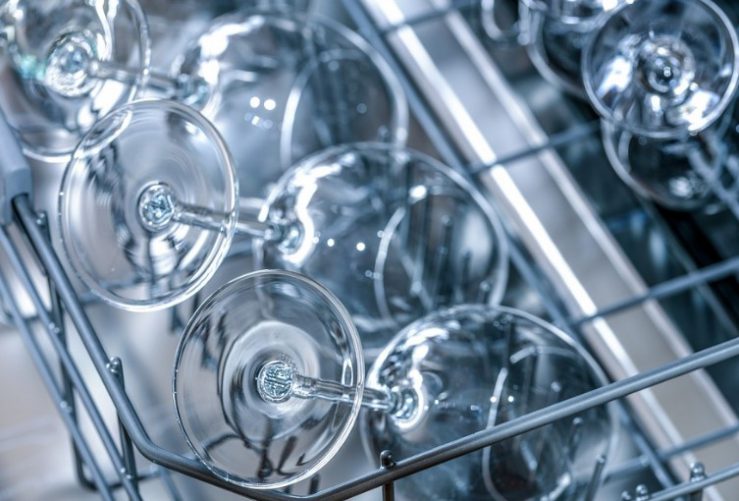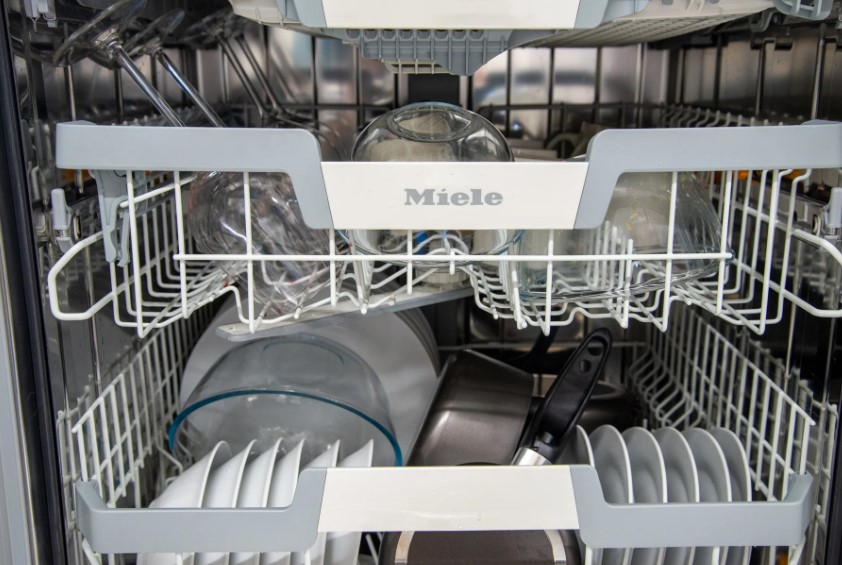How To Know When To Clean Your Dishwasher?

It can be tough to know when to clean your dishwasher. After all, it’s a big investment and you don’t want to waste any time or money. However, with a little knowledge, you can clean your dishwasher whenever it’s needed without damaging your machine or wasting any time. Read more about this topic on epodcastnetwork.com. In this blog post, we’re going to outline the six signs that your dishwasher needs to be cleaned and the best way to do it. We’ll also cover the best time of the year to clean your dishwasher, what to avoid when cleaning your dishwasher, and FAQs about cleaning your dishwasher. By the end of this post, you’ll have everything you need to know to clean your dishwasher the right way.
Table of Contents:
1. Signs That Your Dishwasher Needs To Be Cleaned
When it comes to keeping your dishwasher clean, it’s important to check a few key areas. By knowing the signs that your dishwasher needs cleaning, you can avoid a lot of hassle and waste. Below, we will outline each of these signs and provide tips on how best to take care of your dishwasher.
- Check the water pressure – If you’re noticing that the water pressure in your home is low, it might be time to give your dishwasher a cleaning. Low water pressure can lead to poor drainage which can results in dirty dishes being left in the machine long enough for bacteria to grow.
- Look for water spots or streaks – If you notice that there are water spots or streaks on any part of your dishwasher interior, it might be time to give it a cleaning. This could be caused by dried-on food particles, dirty detergent tabs, or even soap buildup on the walls of the machine. All of these things can lead to poor drainage and stained dishes.
- Check the spray arm – If you’re experiencing problems with dishes not being sprayed evenly (or at all), it might be time to give your dishwasher a cleaning. This issue could result from build-up on the spray arm or clogged pipes leading from the machine into the sink.
- Check for food build- up – One common sign that your dishwasher needs cleaning is if there is food build-up on any part of its interior walls or floors.. This mess could be caused by leftover food particles from previous cycles, wet dishes left in too long without being washed first, or even pet hair!
- Listen for strange noises – Another sign that your dishwasher needs cleaning is if you hear strange noises coming from within its walls.. This might include clanging sounds, bubbling noises, or gurgling sounds.. These sounds indicate that something isn’t working correctly within the machine and may need attention from a professional technician!
- Check for leaks – Finally, one common sign that your dishwasher needs cleaning is if there are leaks coming out of its sides.. This could mean that either pipes connecting between different parts of the machine have bursted open OR there is something blocking those pipes (such as built up soap). In either case, fixing these leaks may require professional help!
- Look for soap build- up – One final sign that your Dishwashers needs some attention is if there’s soap build-up present anywhere on its interior surfaces.. This sudsy mess can occur if detergent tabs are not completely removed before each cycle or if too much liquid was used when filling uphesa reservoir. Again,. this situation may necessitate professional help in order to clean everything properly!
2. How Often To Clean Your Dishwasher
When it comes to keeping your dishwasher clean, it’s important to follow a few guidelines. First and foremost, be sure to check the owner’s manual – each dishwasher is different and will have its own cleaning instructions. Generally, it’s a good idea to clean your dishwasher every month or two, but if you have hard water you may need to clean it more often.
One of the most common signs that your dishwasher needs cleaning is when spots start appearing on dishes or there are bad smells coming from it. If this is happening, use a dishwashing detergent like affresh and run the dishwasher empty on the hottest setting to clean it. Be sure to also use vinegar, baking soda, or another type of safe cleaning agent when cleaning your dishwasher.
If you’re curious about how often your particular dishwasher needs cleaning, consult your owner’s manual. Some Dishwashers have a self-clean cycle that requires you to empty and clean the machine every so often!
3. The Best Way To Clean Your Dishwasher
Almost every dishwasher has areas that need to be cleaned in order to keep it running smoothly. By following these simple steps, you can clean your dishwasher quickly and easily and prevent any build-up from occurring.
First, identify the problem areas in your dishwasher. This can be done by taking a look at the manual that came with your machine or by looking online. Next, use a toothbrush or scrubber to clean these areas. Make sure to clean all of the crevices and corners of the machine.
Next, use a diluted bleach solution or white vinegar to clean the whole dishwasher. Follow this step by running the dishwasher on its longest and hottest cycle – this will sanitize it completely. Finally, monthly or two later you should again take a look at all of the areas that need cleaning and do so using the same method as before. Cleaning your dishwasher is easy and only takes a few minutes – so don’t wait!
4. What To Avoid When Cleaning Your Dishwasher
The dishwasher is a necessary evil in most households. It cleans dishes quickly and efficiently, right? Not necessarily. In fact, overloading your dishwasher can actually prevent dishes from getting clean. This is because the dishwasher was not designed to clean as many dishes at once. Instead, it was designed to clean one dish at a time.
This means that if you overload your dishwasher, your dishes will sit in the machine for longer than they need to. This can lead to bacteria growth and ruin your dishes. Worse yet, dirty dishes left in the dishwasher can also lead to a build- up of grime and detergent over time. If you don’t clean your dishwasher regularly, it will become clogged with dirt and food particles which will require you to use harsher chemicals to clean it – something you may not want to do if you’re using environmentally friendly products like vinegar or water!
When it comes time for your kitchen appliance to be cleaned, always use vinegar and water or a specifically designed cleaner like All-Clad’s Precious Glass Cleaner. Avoid using harsh chemicals when cleaning your dishwasher – this could damage the appliance or leave behind a residue that is difficult to remove.
5. FAQs About Cleaning Your Dishwasher
There’s no denying that dishwashers are a necessary evil in most homes. They clean our dishes quickly and efficiently, and they’re usually pretty easy to operate. However, like everything else in life, there are benefits and risks to cleaning your dishwasher. Below, we’ll outline the most important points about cleaning your dishwasher.
First and foremost, cleaners are a great way to keep your dishwasher clean and free of built-up dirt, food residue, and other contaminants. In addition, many cleaners also have anti-bacterial properties which help to keep your dishwasher clean from the inside out. In fact, one study found that using a cleaner reduced the number of foodborne illnesses by up to 73%.
However, there are also some risks associated with cleaning your dishwasher. For example, while it’s safe to use most household cleaners in your dishwasher, some may not be safe for certain types of glassware or cookware. Additionally, improper cleaning can damage the interior surfaces of your dishwasher – leading to costly repairs or even replacement parts!
When it comes to cleaning your dishwasher – whether it’s weekly or once a month – there is no perfect answer. The best approach depends on how often you use your kitchen appliances and how dirty they get. Generally speaking though, you should aim for at least monthly maintenance in order for your dishesto come out sparkling clean each time!
6. Get The Most Out Of Your Dishwasher
Cleaning your dishwasher can be a chore, but it’s worth it to get the most out of it. Follow these simple steps to help keep your dishwasher running smoothly.
First, check the model number of your dishwasher to make sure that you’re using the correct one. Then, inspect inside the dishwasher for any dirty dishes or debris. If there is anything in there, take it out and clean it up before continuing.
Next, check under the dishwasher for any food or water that may have spilled inside. If there is anything stuck under there, use a putty knife to remove it.
Next, check the water inlet screen for any obstructions or debris. If there is anything blocking the water from entering the dishwasher properly, remove it using a plunger or a vacuum cleaner.
Next, check the drain hose for any kinks or tears – if they exist, straighten them out before continuing.
Finally, check the float switch and water heater to make sure they’re working properly. If not, fix them as necessary before starting your wash cycle.
When you’ve completed all of these checks, load your dishes into the dishwasher and press start! Your dishes will be clean and ready when you are!
All In All
It’s important to keep your dishwasher clean to prevent the build-up of bacteria and grime. Use these tips to keep your dishwasher clean and in good working condition. Cleaning your dishwasher regularly will prolong its life and prevent costly repairs down the road.









